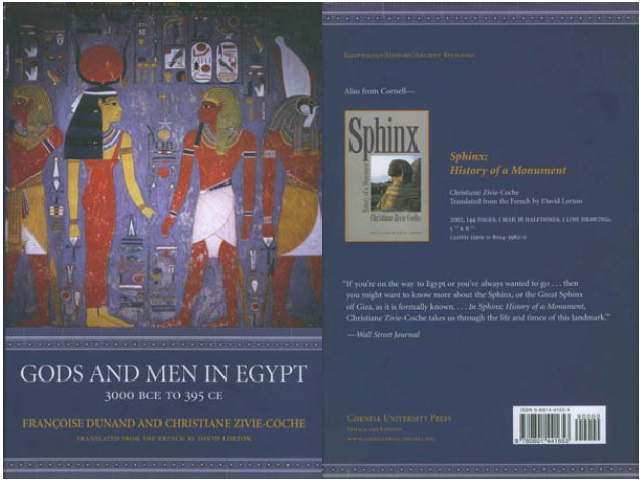Dunand, F. & C. Zivie–Coche. 2004. Gods and men in Egypt 3000 BCE to 395 CE. – Ithaca/London, Cornell University Press (translated from the French by David Lorton)
Abstract
This English translation of a volume originally published in 1991 is a most welcome addition to the textbooks on Egyptian religion already available in English. There are not many recent works that attempt to describe the Egyptian religion in such broad terms, and this is a book that successfully incorporates much of recent scholarship on the subject.
Thanks to the translator, Egyptologist David Lorton, already several volumes on the subject of Egyptian religion have become available to the English reader. Most notable among these are books by Traunecker, Hornung and Assmann (Assmann, 2001, 2005; Hornung, 1999, 1999; Sauneron, 2000; Traunecker, 2001), all Cornell University Press. Another important work by Hornung (translated and edited by Baines in 1982), is in need of an update since the publication in 2005 of a reworked edition of the original German work. Yet, in those books, the Egyptian religion was described principally for the period of dynastic history, leaving out much of the later developments. The Ptolemaic and Roman temples are sometimes mentioned, but only because of their contribution to understanding the earlier phases of the Egyptian religion. The context of these temples, in which the influences of Hellenism and other religions were having a significant impact, is normally left out of such overviews. The book by Dunand & Zivie–Coche is a significant deviation of this practice, as they set out specifically to chart the development of the Egyptian religion from its beginnings in 3000 BCE into late Antiquity. The book is divided into two sections, whereby Zivie–Coche is responsible for describing the Egyptian religion of the Pharaonic period and Dunand deals with the Hellenistic and Roman periods. On p. 72, Zivie–Coche remarks “We can speak of one religion throughout the land and through the course of three millennia of a specific, uninterrupted culture”. Read more...
Downloads




